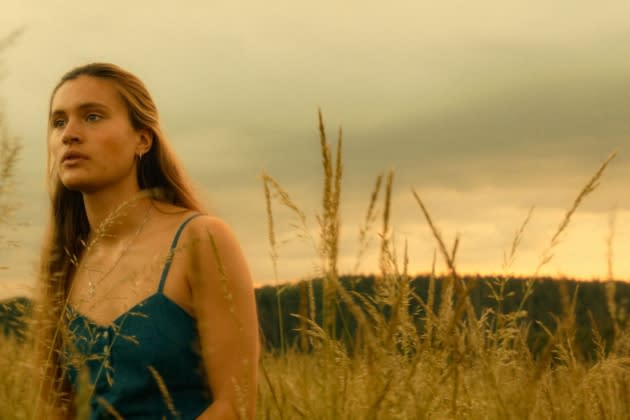Berlin Review: Emily Atef’s ‘Someday We’ll Tell Each Other Everything’
- Oops!Something went wrong.Please try again later.

Emily Atef’s latest feature is something of a curate’s egg, a well-made foray into high-end romantic lit that’s saddled with some off-putting baggage about the reunification of Germany post-1989. The Berlin Film Festival competition entry is clearly personal to the novel’s writer, Daniela Krien, who was born, mid-’70s into the former GDR, and it does offer a layer of quirky detail, such as an unnerving car crash involving what looks to be Trabant. But for a film that shows a lot of naked flesh and spends a lot of time documenting a young woman’s complicated sexual awakening, the political table-talk can be distracting and even wearying, notably on the occasion when a whole (recently reunited) family bursts into “The Song of The Peat Bog Soldiers.“
The year is 1990, and the young woman in question is 18-year-old Maria (Marlene Burow), who has moved away from her divorced mother to spend time with her boyfriend Johannes (Cedric Eich) on his parents’ farm. She chips in with the chores, but it’s clear that her heart isn’t really in it (“She’s sweet, but farm life isn’t for her,” notes Johannes’ mother). Instead, she breezes through the cornfields pausing mostly to dip into Dostoevsky’s novel The Brothers Karamazov in picturesque settings. Johannes, meanwhile, is a little bit behind her on the path to enlightenment, and on a trip to Munich he buys an expensive camera, which he intends to use as his ticket to art school in Leipzig and a way out of rural Thuringia.
More from Deadline
Though she’s far from a country person, Maria isn’t exactly itching to leave, and where the plot takes her next is subtly foreshadowed by a snippet of conversation about the nearest neighbor, Henner (Felix Kramer), and his legendary libido. Their subsequent meeting is the stuff of bodice-rippers: terrified into silence by Henner’s two snarling guard dogs, Maria allows him to invade her personal space with an intensity that nowadays might be considered indecent assault. Nevertheless, Maria is hooked, and begins an obsessive affair with Henner that takes the film into much darker territory than the steamy Poldark-style set-up would seem to indicate. Their time together is much more Last Tango in Paris: secret, silent, and every bit as destructive. (“Now I’ve caught you,” he says, with obvious self-awareness, “and dragged you into my cave.”)
Nevertheless, the outside world continues to intrude, bringing with it a certain amount of Proustian recall that will be familiar to Germans of a certain age but doesn’t add much texture for everyone else. A grandmother marveling at the invention of whipped cream in a can is a lovely moment, but, ironically, it says far more about the characters here than myriad conversations about the tanking of the German economy after the wall came down (“We needed a longer transition,” says one). Maria’s past as a member of a Communist kindergarten called the Young Pioneers likewise seems to come from thin air, but, again, seems like so much hot air in a film that clocks in at a hefty 129 minutes. Much better are the subtle allusions to the new freedoms that await outside Thuringia, as evidenced when Maria and Johannes go to the city, waved through a police checkpoint with no fuss while Depeche Mode’s 1987 electro-pop hit “Behind the Wheel” plays loud.
The scene, by itself, drips with youthful idealism and a sense of freedom that somehow never develops much further. Counter to the mouthful of a title, there’s not much to tell beyond a handsome if not exactly plausible cautionary tale about the perils of mistaking lust for love and falling for the nearest bit of rough.
Best of Deadline
Sign up for Deadline's Newsletter. For the latest news, follow us on Facebook, Twitter, and Instagram.
